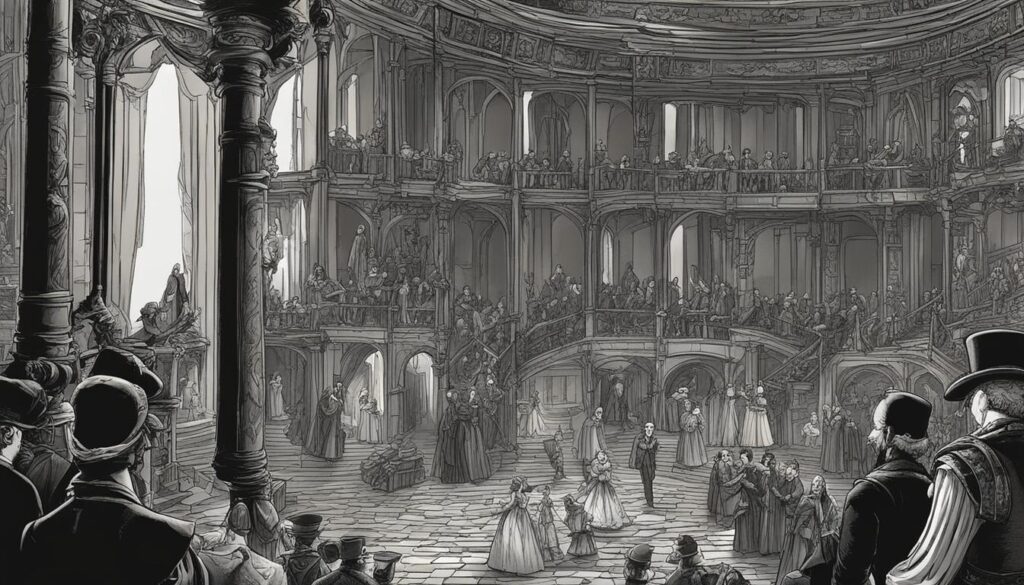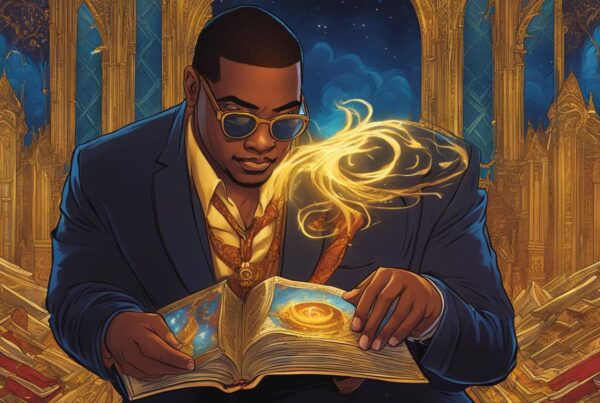Shakespeare, one of the greatest literary figures of all time, continues to fascinate and intrigue scholars and enthusiasts alike. Katherine Duncan-Jones’s book, “Shakespeare: An Ungentle Life”, offers a fresh and comprehensive perspective on the life and times of the bard.
In this book summary, we explore the captivating story of Shakespeare, delving into his personal life, literary contributions, controversies, and lasting legacy. Through Duncan-Jones’s meticulous research and unique viewpoint, readers are offered a glimpse into the complex and often enigmatic figure behind some of the world’s greatest works of literature.
Key Takeaways:
- Explore Shakespeare’s life and literary achievements through “Shakespeare: An Ungentle Life” by Katherine Duncan-Jones.
- Gain insight into Shakespeare’s unique artistic style and themes that make his works timeless and captivating.
- Discover the controversies and debates surrounding Shakespeare’s life and legacy, including discussions about his authorship and identity.
- Examine Shakespeare’s profound influence on literature and culture worldwide, from adaptations of his plays to his enduring impact on the global stage.
- Through Duncan-Jones’s research and viewpoint, readers are offered a fresh and comprehensive perspective on Shakespeare’s life and times.
Introduction to Shakespeare’s Life
William Shakespeare, widely regarded as the greatest playwright in history, left an indelible mark on the literary world with his plays and sonnets. Born in Stratford-upon-Avon, England, in 1564, Shakespeare’s early years were marked by his father’s political aspirations and financial difficulties. Despite this, he received a good education and began his literary career in London as an actor and playwright.
Shakespeare’s career spanned over two decades, during which he penned more than thirty plays and numerous sonnets that would eventually become some of the most studied and performed works in the English language. His plays and sonnets are known for their poetic language, intricate plots, and compelling characters that explore the human condition.
| Year | Event |
|---|---|
| 1564 | William Shakespeare is born in Stratford-upon-Avon, England. |
| 1582 | Shakespeare marries Anne Hathaway and they have three children. |
| 1592 | Shakespeare begins his career as a playwright and actor in London. |
| 1599 | Shakespeare becomes a partner in the Lord Chamberlain’s Men, later renamed the King’s Men, a company of actors performing at the Globe Theatre. |
| 1616 | Shakespeare dies at the age of 52. |
Shakespeare’s legacy lives on today, with his works being performed on stages around the world and adapted into countless film and television productions. His unique writing style, universal themes, and enduring contributions to the literary world have solidified his place in history.
Shakespeare’s Works and Literary Contributions
William Shakespeare is widely regarded as one of the greatest playwrights in history, thanks to his extensive body of work that comprises plays and sonnets. His plays have been performed throughout the centuries and adapted into various forms, making him one of the most influential figures in the literary world.
Shakespeare’s plays are as follows:
| Title | Year Published | Genre |
|---|---|---|
| Hamlet | 1601 | Tragedy |
| Romeo and Juliet | 1597 | Tragedy |
| Macbeth | 1606 | Tragedy |
| King Lear | 1606 | Tragedy |
| Othello | 1603 | Tragedy |
| Julius Caesar | 1599 | Tragedy |
| The Tempest | 1611 | Comedy |
Aside from his plays, Shakespeare is also famous for his sonnets, a collection of 154 poems that explores themes of love, beauty, and morality. The sonnets are written in iambic pentameter, a style of poetry that has become synonymous with Shakespeare’s name.
Shakespeare’s literary legacy extends beyond his works’ popularity and timeless appeal. His contributions to the English language cannot be overstated, as his plays and sonnets have introduced several phrases and words to the lexicon of the English language. This influence has been recognized globally, with his works translated into various languages and adapted into several mediums, including stage productions, films, and even video games.
Historical Context of Shakespeare’s Time
To truly understand Shakespeare’s works, it’s crucial to understand the historical and cultural context of his time. Shakespeare lived during the Elizabethan era, a period of English history marked by significant cultural, social, and economic changes.
The theater scene was thriving during this time, with plays being performed publicly for the first time. London, in particular, was a hub of theatrical activity, with Shakespeare’s plays drawing large crowds.
Shakespeare was also heavily influenced by the cultural and intellectual trends of his time. The Renaissance was in full swing, and there was a renewed interest in classical ideals and humanism. The printing press had also been invented, allowing for the wide dissemination of ideas and information.
Additionally, the political and religious climate of the Elizabethan era impacted Shakespeare’s works. The English Reformation had occurred just prior to Shakespeare’s birth, resulting in significant changes in the religious landscape of England. Political tensions were also high, with Queen Elizabeth I’s reign marked by both stability and turmoil.

Understanding the historical context of Shakespeare’s time is essential in appreciating the complexity and nuance of his works.
Shakespeare’s Artistic Style and Themes
Shakespeare’s writing style is renowned for its intricate language and poetic imagery. He often used metaphors and wordplay to convey his characters’ emotions and thoughts, making his works both timeless and captivating. His use of iambic pentameter, with ten syllables per line and a stressed-unstressed rhythm, remains influential in English literature to this day.
Recurring themes in Shakespeare’s works include love, power, betrayal, and revenge. His plays explore the complexities of the human condition and the universal experiences that bind us all. Additionally, Shakespeare incorporated motifs such as death, madness, and nature throughout his works, adding layers of meaning and symbolism.
In his plays, Shakespeare often included subplots and secondary characters to add depth and texture to his works. The use of soliloquies, where a character speaks their innermost thoughts aloud, also became a signature element of his writing style.
Overall, Shakespeare’s artistic style and themes have had a lasting impact on English literature and continue to inspire and captivate audiences around the world.
Controversies and Debates Surrounding Shakespeare
In addition to Shakespeare’s celebrated legacy, his life has also been subject to various controversies and debates. One of the most prominent topics is the question of Shakespeare’s authorship. Despite the overwhelming evidence and consensus that he authored his own works, a small but vocal minority argues that someone else, such as Francis Bacon or Christopher Marlowe, was the true author of Shakespeare’s plays and sonnets. This debate has been ongoing for centuries, and it continues to this day.
Another area of contention is the various conspiracy theories that surround Shakespeare’s life. For example, some have suggested that he was a secret Catholic in Protestant England, or that he was involved in espionage. These theories are often based on scant evidence, but they persist nonetheless.
Despite the skepticism that surrounds Shakespeare and his life, his works continue to captivate audiences to this day. Regardless of who may have written them, the beauty and power of his plays and sonnets remain enduring testaments to his talent and legacy.
Shakespeare’s Influence on Literature and Culture
The impact of Shakespeare’s works on literature and culture is immeasurable. Adaptations of his plays, sonnets and other works have been translated into hundreds of languages across the globe, cementing his status as one of the greatest literary figures in history. His works have been adapted into countless plays, films, TV shows, musicals, and even video games over the years, with each generation offering new re-imaginings of his timeless stories.
From Leonardo DiCaprio’s Romeo + Juliet modern adaptation to the whimsical Gnomeo & Juliet animated film, Shakespeare’s works have inspired a range of creative interpretations. His ability to convey complex emotions and universal themes through his writing has made his works relevant to people of all ages, nationalities, and cultures.
The universality and timelessness of his writing is a testament to its profound cultural significance. His works have shaped literature, theater, and pop culture in ways that continue to echo throughout the generations.

International adaptations of Shakespeare plays
| Country | Play | Adaptation |
|---|---|---|
| India | Othello | Omkara (2006 Hindi film) |
| Japan | Macbeth | Throne of Blood (1957 film) |
| Italy | The Two Gentlemen of Verona | I Due Gentiluomini di Verona (1972 film) |
| Brazil | Twelfth Night | A Dama do Lotação (1978 film) |
| China | Hamlet | The Banquet (2006 film) |
Critical Reception and Legacy of Shakespeare
Shakespeare’s works have been met with critical acclaim and admiration throughout history, cementing his posthumous reputation as one of the greatest playwrights of all time. In modern times, his influence on literature and culture is still evident, and his plays continue to be performed in theaters worldwide.
| Year | Award or Recognition |
|---|---|
| 1599 | Shakespeare opens the Globe Theatre |
| 1623 | The First Folio, a collection of Shakespeare’s plays, is published posthumously |
| 1769 | The first Shakespearean production in the United States is staged |
| 1849 | Edgar Allan Poe declares Shakespeare to be “the greatest writer of all time” |
| 1986 | Shakespeare is inducted into the American Theater Hall of Fame |
| 2016 | Shakespeare’s 400th death anniversary is commemorated worldwide |
Shakespeare’s legacy is perhaps best seen in the countless adaptations, reimaginings, and references to his works in modern popular culture. From television shows like Westworld to films like The Lion King, his influence continues to permeate all corners of the entertainment industry. As such, Shakespeare’s legacy will undoubtedly continue to endure for generations to come.
Katherine Duncan-Jones’s Perspective on Shakespeare
As a respected Shakespearean scholar and biographer, Katherine Duncan-Jones brings a fresh perspective to understanding the life of the bard. Her book “Shakespeare: An Ungentle Life” combines extensive research with insightful interpretations of Shakespeare’s works and historical context.
Duncan-Jones challenges many of the common assumptions about Shakespeare’s life and offers a nuanced portrait of the man behind the plays. She draws on a wealth of primary sources to provide new insights into Shakespeare’s personal relationships, his financial dealings, and his artistic process.
Furthermore, Duncan-Jones’s book sheds light on the political and religious controversies of Shakespeare’s time, providing valuable context for understanding the themes and motifs that run throughout his plays and sonnets.
Overall, Duncan-Jones’s perspective on Shakespeare is a valuable addition to the scholarship on the bard. Her research and insights provide a deeper understanding of Shakespeare’s life and legacy, and her book is a must-read for anyone interested in this iconic figure of English literature.
Conclusion
In conclusion, “Shakespeare: An Ungentle Life” by Katherine Duncan-Jones offers a comprehensive summary of the life and works of the bard. From his early years to his rise to fame as a playwright, Shakespeare’s enduring legacy continues to impact literature and culture on a global scale.
Throughout this article, we have explored the historical context of Shakespeare’s time, his artistic style and themes, controversies and debates surrounding his authorship, and his influence on literature and culture. We have also examined the critical reception of his works and his posthumous reputation as one of the greatest cultural figures in history.
As presented by Duncan-Jones, Shakespeare’s life was a tumultuous journey that has left a lasting impact on the world. Her unique insights and research have shed new light on the bard’s life and times, making this book a must-read for anyone interested in the literary and cultural impact of Shakespeare.
Finally, we encourage readers to explore the pages of “Shakespeare: An Ungentle Life” to immerse themselves in the captivating story of the bard and his enduring legacy. In conclusion, Shakespeare’s life might have been ungentle, but his impact on literature and culture remains unmatched.



